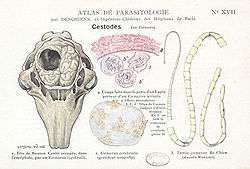Coenurosis

Coenurosis (a.k.a. Caenurosis and Coenuriasis, gid or sturdy in the vernacular) is a parasitic infection that develops in the intermediate hosts of some tapeworm species (Taenia multiceps,[1] T. serialis,[2] T. brauni, or T. glomerata) and are caused by the coenurus, the larval stage of these worms. This disease occurs mainly in sheep and other ungulates,[3] but occasionally can occur in humans too by accidental ingestion of worms' eggs.
Adult worms of these species develop in the small intesine of the definitive hosts (dogs, foxes, and other canids), causing a disease from the group of taeniasis.[4] Humans cannot be definitive hosts for these species of tapeworms.
Coenurosis in Wild Animals
Although Coenurosis is more commonly associated with domestic animals, it has also been documented in wildlife. It has been found in mountain ungulates in the French Alps. It is believed that the ungulates are being contaminated by infected sheepdogs. Understanding how this disease is transmitted from sheepdogs to wild animals is important in managing the spread of this potentially dangerous zoonotic disease. A potential management strategy would be for farmers to properly dispose of carcasses that they find on their land. In wild gelada monkeys in Ethiopia Coenurosis was found to effect the fitness of these primates. Mortality increased and fertility was inhibited. The disease has also been documented in wild sheep and other ruminants and rarely documented in rodents, horses, and cats. Very few cases have been identified but this could be due to limited research on wild coenurosis. Animals infected with this disease tend to hide or take cover from predators and therefore may not be seen by humans. However, coenurosis has been known to increase mortality and decrease fertility in wild animal populations.
See also
References
- ↑ University of Pennsylvania - Veterinary Medicine: Taenia multiceps Homepage
- ↑ University of Pennsylvania - Veterinary medicine: Taenia serialis Homepage
- ↑ Stanford University: Coenurosis - Hosts
- ↑ Stanford University: Taeniasis
External links
- Stanford University: Coenurosis